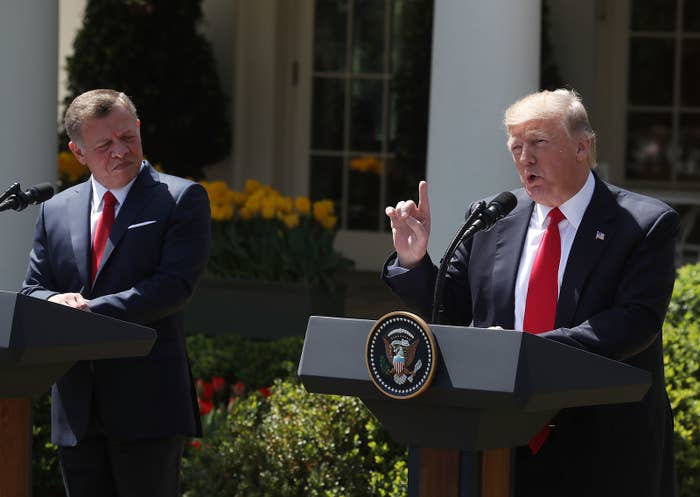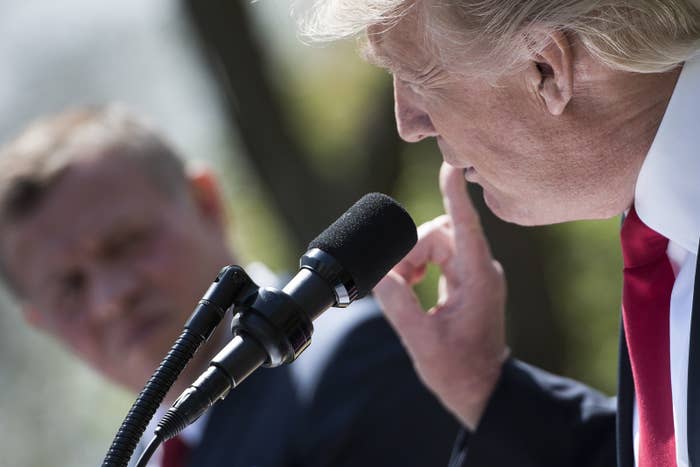
WASHINGTON — Pentagon officials were left confused after President Donald Trump appeared to signal a potential future policy change toward Syria with tough words against the government’s deployment of chemical weapons.
Trump said on Wednesday, at a joint press conference with Jordan’s King Abdullah II, that images of children and other civilians killed by a suspected sarin gas attack a day earlier in the Syrian city of Idlib “crosses many lines, beyond a red line, many many lines.” He said he was appalled by the attack and called it “unacceptable,” while adding that his opinion of Syrian President Bashar al-Assad had changed.
He appeared to open the door to US action in response to the chemical attack, as had his ambassador to the United Nations, Nikki Haley, earlier in the day while chairing an emergency session of the Security Council.
But three defense officials told BuzzFeed News they cannot begin to craft a military response, if that is what Trump wants, without a clear understanding of what the president wants to see happen in Syria. Does he only want the Assad regime to stop using chemical weapons? Does he want regime change? Is he seeking a negotiated settlement? Or were Trump’s comments simply rhetoric?
US officials have surmised that the Assad regime was behind the attack on Tuesday, which killed at least 70 people and injured hundreds more after US radar showed Syrian aircraft in the area of attack. In the aftermath, scores of photos showed bodies lying on the ground, with white foam coming out of noses and mouths as the victims suffocated to death. The regime has repeatedly been accused of using chemical weapons against its people, including chlorine gas.
The three defense officials told BuzzFeed News they believe Assad may have launched Tuesday’s attack to test the president, particularly after members of his administration had indicated Assad could stay in power. Most notably, Secretary of State Rex Tillerson said Thursday that: "I think the status and the longer-term status of President Assad will be decided by the Syrian people."
At the time, many heard a new Syria policy, one that no longer called for Assad to leave power, as it had during the Obama administration.
On Tuesday, as reports of the chemical attack became public, the White House stuck to its new policy. It called Assad’s grip on power, despite a six-year civil war, a “political reality,” and said it was up to the Syrian people to decide the country’s future.
Trump and officials in his administration also had indicated that US policy was focused on defeating ISIS, not addressing the regime. White House press secretary Sean Spicer said that “the United States has profound priorities in Syria and Iraq, and we’ve made it clear that counterterrorism, particularly the defeat of ISIS, is foremost among those priorities.”
On Wednesday, however, Trump and Haley shifted tones again.
Haley portended US intervention, saying: "When the United Nations consistently fails in its duty to act collectively, there are times in the life of states that we are compelled to take our own action. Pointing the blame at Russia, she added: "For the sake of the victims, I hope the rest of the council is finally willing to do the same."
But both stopped short of outlining what an acceptable outcome was or what US intervention could look like. Trump told reporters he does not like to telegraph his responses.
“I’m not saying I’m doing anything one way or the other,” Trump said. “But I’m certainly not going to be telling you, as much as I respect you,” referring to the reporter who asked the question.
Defense officials have repeatedly said that military options in Syria are limited. Under the current strategy, the US could destroy airstrips or Syrian aircraft, but that would only have a short-term effect. The Syrians could easily repave an airstrip or obtain planes from their Russian allies. Nonmilitary options like sanctions have the same problem — the Russians would likely supplement any lost funding.

And even if the US acted militarily in response to Tuesday’s attack, under what authority would it enter Syria? The 2001 Authorization for Use of Military Force, which has become the catch-all legal justification for military operations against groups like al-Qaeda and ISIS, would be hard to contort towards Assad. After Tuesday’s attacks, Trump faced criticism from fellow Republicans, who have long argued for greater intervention in Syria, but have yet to vote on new authorities.
“The question is not how you deter the Assad regime from using chemical weapons. The question is what is Trump going to do about Assad, the Russians, and the Iranians – all of whom are accountable for ongoing war crimes in Syria,” Jenny Cafarella, a Syrian analyst for the Washington-based Institute for the Study of War, told BuzzFeed News.
Trump’s approach toward Syria has often been aligned more with Russian President Vladimir Putin than US policy under President Obama.
During the presidential campaign, Trump repeated a common Russian talking point about the Assad regime, saying the Syrian leader was better than a potential worse alternative.
“If [the rebels] ever did overthrow Assad, you might end up as bad as Assad is, and he is a bad guy,” Trump said during the Oct. 19 presidential debate. “You may very well end up with worse than Assad.”
Upon entering the White House, the administration was eager to limit the extent of US intervention in the Middle East.
“The Trump administration had not set out to solve the entire Syria crisis as its priority in the Middle East,” Cafarella said. "Instead, they appeared to proceed in stasis, focusing on [the ISIS capital city of] Raqqa and areas already liberated from ISIS with an unclear, and possibly confused, approach to the wider civil war."
Crafting a new policy does not happen in a day and the civil war in Syria transcends its borders; it’s become a regional, global proxy war as well. But the absence of answers to the questions that shape policy makes its hard to say for sure what kind of change is happening, if any, officials around the Pentagon explained.
